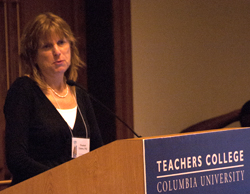Looking Beyond the Negative Realities of Mental Disability
Blackman Lecturer Elisabeth Dykens takes on the complexity of intellectual and developmental disorders
By Suzanne Guillette
“One of our most difficult duties as human beings is listening to the voices of those who suffer.”
Those words, written by Arthur Frank, in his book The Wounded Storyteller: Body, Illness and Ethics, set the tone for TC’s 2011 Blackman Lecture, “Toward a Positive Psychology of Intellectual Disabilities,” which was delivered in early May by psychologist Elisabeth Dykens of Peabody College, Vanderbilt University.
Dyken’s presentation was part of “When Worlds Collide: Facing the Challenges of Special Education in the New Millennium,” a conference that highlighted “current research in the area of intellectual disabilities, as well as work on violence and bullying in schools and its effects on children with and without disabilities.”
Co-sponsored by the Center for Opportunities and Outcomes for People with Disabilities, the Gottesman Libraries and TC’s Office of Alumni Relations, the conference drew more than 130 students, faculty and alumni, many of whom are special educators and clinicians.
As Dykens pointed out, many individuals with intellectual and developmental disabilities do, indeed, suffer. Theses populations have high rates of abuse. Forty-percent have psychiatric, behavioral or emotional problems. Many are prone to obesity due to sedentary lifestyles. Looking beyond these “negative realities,” Dykens explored a more optimistic way of viewing this population.
Her research has focused on highlighting strengths while nevertheless acknowledging weaknesses. “Positive psychology is not about the ‘smiley face,’” she said. “It’s about complexity.”
In a discussion of two syndromes, Prader-Willi and Williams, Dykens illustrated the unusual neurocognitive strengths and character strengths that many people with intellectual and developmental disabilities possess.
For example, those with Prader-Willi syndrome -- a relatively rare condition in which people overeat to a life-threatening degree -- tend to have exceptional nurturing abilities. “They’re very interested in caretaking,” said Dykens. “They love working with babies and animals.”
Individuals with Williams syndrome, a rare genetic developmental disability, tend to respond in an overwhelmingly positive way to music, which can offset their often extreme anxiety.
Dykens spotlighted a “need to cast a more inclusive behavioral net and to look at strengths and positive emotions, as well as the problems.” She also called for greater focus on the parents of children with intellectual and development disabilities, who have been shown biologically to suffer higher levels of stress than other parents.
The conference was also the culmination of an online spring course entitled “ Center for Opportunities & Outcomes for Persons with Disabilities Conference Course,” created by Christine Pawelski, Adjunct Associate Professor in the Health and Behavior Studies Department and Senior Research Associate at the Center for Opportunities and Outcomes for People with Disabilities. The course highlights the research and writings of special education professionals, addressing critical issues in the field.
This year’s version of the course featured TC special education alumni who had recently written articles or books in critical areas. Among the online TC experts who also attended the Conference were Alberto Bursztyn and Yoon-Joo Lee, who teach at Brooklyn College, City University of New York. They shared their chapters from Bursztyn’s newly released book, Childhood Psychological Disorders: Current Controversies.
“Our goal for the course and conference was to give current master’s and doctoral students a real sense of TC’s history,” Pawelski said, “and to help create a community of life-long learners and advocates comprised of past and current TC students.”
Published Wednesday, Jun. 1, 2011
